- Home
- Bruce, Leo
Death of a Commuter Page 5
Death of a Commuter Read online
Page 5
“She means of the ancien régime,” said Patsy. “After us the deluge—of bright new villas.”
“Who lives in the other old house in this road?”
“Mr. Rumble. He lost his wife a couple of years ago and lives quite alone now. You must meet him.”
“So your husband says.”
“He’ll be at Chatty’s on Sunday.”
“Tomorrow, darling,” said Patsy.
“Oh yes, tomorrow. He’s a good next-door-neighbour. Never a sound. Some more tea?”
“It’s coffee, mums.”
“No more, thank you, Mrs. Thriver. I promised to call in and see the doctor this evening.”
“I’ll phone Chatty and tell her to ask you. She’ll be delighted to have another man. Didn’t someone tell me you have your son with you?”
“My son? No, I’ve been spared that. My least favourite pupil has been wished on me for the holidays. But we only arrived today at lunch-time.”
Carolus thought Enid Thriver looked far less vague as she said, “I know. Things get around very quickly in Brenstead. I must make sure Chatty asks him, too.”
“Not if any respectable young girls are going to be there.”
“Like that? You’ve been warned, Patsy. Elspeth Parador has a niece staying with her, I believe. She naturally doesn’t want to be alone …”
Then quite suddenly the pleasant tranquility of the room was split open. Patsy, the downright Patsy, let out an ear-splitting shriek. Thriver was on his feet at once and Enid rushed over to her daughter.
“Patsy … darling …”
“What on earth?”
Carolus watched the three of them closely.
It was thirty seconds before Patsy was able to speak and when she did so only one word came from her.
“There!” she said, and pointed towards the uncurtained window.
It was enough for Carolus who did not waste time in going over to the window, but dashed into the hall and made for the front door. Even so, he was too late. As he ran across the round lawn towards the gates he heard, from the main road ten yards away, the sound of a motor-cycle starting with the first kick. He did not pause but ran to the corner. No use. He was in time to see a motor-bicycle without lights disappear. Just before it went out of sight its rider, as if derisively, switched on his lights, but the number plate was invisible.
He returned to the house to find Patsy in control of herself.
“I’d like a drink, please,” she said to her father.
“He’s gone,” Carolus told her. “Off on a motor-bike before I could get a glimpse of him. What exactly did you see?”
“A face,” said Patsy succinctly. “Nothing more, really. But he was wearing dark glasses. I’ve always had a fear since childhood of looking at a window at night and seeing a face outside.”
“You’re not the only one,” said Carolus. “It’s quite a common fear.”
“I forgot to draw the curtains,” said Enid.
“Absurd to get hysterical, I know,” Patsy admitted, regaining her downright manner. “But it was rather beastly.”
“Obviously you wouldn’t be able to recognise the face again,” Carolus suggested.
“Shouldn’t think so. I had the impression that it was a youngish man, but that’s all.”
“Were they dark spectacles he was wearing? Or goggles?”
“Spectacles. I’m sure of that.”
“What’s under the window?” asked Carolus, walking towards it.
“Grass. I hate flower-beds against the house.”
“I’m not going to look for footprints,” said Carolus. “I leave that to the police. You’re going to inform them, I suppose?”
“Certainly,” said Thriver. “I don’t want any more of this.”
“They’ll send round a Detective-Constable who’ll take a lot of measurements and that’ll be the last you hear of it”
Thriver turned on him, as though he did not want to hear the police slighted.
“I suppose you know who it was?” he asked.
“I don’t know the name,” admitted Carolus.
“Or why he should be looking in my windows.”
“I think I know that,” said Carolus.
This seemed to annoy Thriver, who went stiffly across to the telephone. But before he lifted the receiver he looked up at Carolus.
“If you know so much perhaps you can tell me whether this will happen again?”
“No. I don’t think it will,” said Carolus at once.
Thriver addressed himself to the telephone. In giving a curt and businesslike account of the occurrence he seemed to regain his good humour.
“Well, police or not” he said, “I want another drink and I’m sure you do, Deene. I heard you sprinting up the road. Sit down for a moment and let Sporlott wait”
When they were once again in his study with glasses in their hands, Thriver said confidentially, “Look here, Deene, you may as well tell me. Do you think what occurred tonight had anything to do with Parador’s death?”
“I don’t want to say too much. I’ve no real idea of anything yet. But by one line of supposition, still very vague, I think it might have, yes. In a very indirect way.”
“If that’s not caginess I don’t know what is.”
Carolus smiled.
“I always start with guessing,” he said. “And my initial guesses are quite often wrong.”
Perhaps Thriver was not accustomed to a third whisky for he seemed to grow quite facetious.
“Turn your crystal ball again,” he said, “and look into the past Do you see a murder?”
“I see one in the future,” said Carolus and left it at that.
Chapter Five
CAROLUS FOUND DR. SPORLOTT’S HOUSE AND SURGERY IN THE centre of the new town. Cotswold stone had been cemented (a crime in itself) to make low walls round a piece of modern sculpture called Resurrection which looked like a tree struck by lightning. A square from which traffic was banned was called The Piazza, and a notice-board read, ‘To the Tiny Tots’ Playground: Qualified Nanny in Charge During Shopping Hours’. Another building had forthright class-free signs, ‘Men’ and ‘Women’. There was no one in sight as Carolus rang Sporlott’s doorbell at nine o’clock.
A woman in a fur coat opened the door.
“Oh, you want Roger. I’m just off to play bridge. ROGER! Here’s your visitor! Good night,” she said briskly, and stepped out into The Piazza.
Sporlott came forward.
“Do come in. Sorry the wife had to go out. Bridge mad. I’m glad you managed to come. Magnus phoned me about you. Sit down,” he said, and after offering Carolus a cigarette lit one himself. Carolus decided to play this one with reserve. He put the red brief-case beside him but it did not attract any attention.
“I had to get that old villain Gobler home this morning. There’s not much wrong with him but he lost a little blood last night. He’s seventy-odd and would have sat there while anyone bought drinks for him. He’s known as a terrible old scrounger chiefly because he’s really got the money to pay for his beer.”
“What do you think happened?”
“A car must have been coming out of Manor Road without headlights, I suppose. The driver saw him all right and pulled up, but not quite soon enough. Its bumper must have caught the old boy behind the knees I should think, quite gently but enough to topple him over. He caught his head on something hard. But no bones broken. I can’t think why the driver didn’t stop.” Sporlott grinned. “Interested in that, too?”
“I’m interested in anything that goes on here at the moment.”
“Then you should come to this part of the town. Things happening all the time. These are the real people—not those status symbolists round the Manor.”
“I can never quite understand why people who live in cheap houses in rows are supposed to be more real than any others.”
Sporlott laughed.
“I used the wrong word, perhaps. You’re interested in Parador�
�s suicide, I understand.”
“If it was suicide.”
“I’m afraid it was. He was sure he had cancer.”
“And had he?”
“Not according to every test we can apply. He had what one might call malignant gastritis. Result of semi-starvation in a Japanese prisoner-of-war camp. But you couldn’t tell him that. We fell out over it. Terrible row, we had. We haven’t spoken for six months. Pity, because I liked him and his wife. But this was an obsession.”
“He wasn’t a man to quarrel with, I gather.”
“Oh, I don’t know. He may have been vindictive in some cases. He just shut me out.”
“Unforgiving, though? If he had meant to leave you anything in his will, do you think he’d have cut you out?”
Sporlott considered this.
“He wouldn’t have left me anything in the first place. He had no reason to. But if he had—yes, I suppose he’d have changed it.”
“He was a private patient of yours?”
“Yes. He went to a colleague of mine after our row. Very good chap, Indian, Kumar Shant. Over at Buttsfield. He’s managed, so far, to keep clear of the cancer issue. I see Elspeth from time to time and she tells me all about it. Parador’s been suffering from heartburn and Kumar has just recently prescribed Buscapine. I don’t know whether he had started taking it Perfectly harmless, anyway.”
“What about sleeping pills?”
“Never took any. Had a thing against them. ‘Take one of those,’ he once told me, ‘and you’ve formed a habit’.”
“You never prescribed Opilactic for him then?”
“Certainly not. I’m against using antibiotics except in cases of real necessity.”
“I noticed Opilactic in the medicine cupboard in Thriver’s bathroom tonight.”
“Really? I’m not surprised. Thriver has a most morbid interest in drugs and ailments.”
“You don’t think you prescribed them?”
“It’s possible. I do seem to remember his complaining of insomnia a year or so ago.”
“These were supplied by Scotter, a local chemist”
“Then I must have prescribed them. Scotter’s a stickler for prescriptions.”
“Where do you think Parador got his?”
“Abroad, very likely. Perhaps he bought it in readiness. You’d be surprised to know how many people walk about with a means to end life handy.”
“So you have confidence in Scotter?”
“Absolutely. Painfully conscientious. He’s a pompous stick, terribly class conscious and all that, but knows his job and sticks to the rules. You’ll find him that not so rare thing, a Socialist snob. Very defiantly as-good-as-you-are, against all class barriers, but can’t help name-dropping and terribly pleased when he’s asked somewhere to play bridge. Know the type?”
“Yes. But I want to meet this example of it.”
Carolus stood up. He felt vaguely unsatisfied as though Sporlott could have told him, without breach of professional confidence, a good deal more than he had chosen to, in spite of his frank manner.
“One piece of advice I’d like to give you,” said Sporlott as Carolus pulled on his coat.” Don’t concentrate too much on the people in the villas. You’ll hear a lot more from the remnants of the old working people. Not from my patients, the real workers, they don’t give a damn who swallowed what But from the few who are stranded in the old town. There’s a man named Boggett, for instance, who worked for Parador. I bet he knows more than all the ladies and gentlemen of the place put together. They’re not with it, Deene. They still think I’m going to call on them in a brougham. People like Boggett talk and hear and remember. Moreover they see.”
As this was the advice which Carolus had been following all his professional life and intended to follow here, he was not profuse in his thanks.
He reached The Royal Oak to find Priggley ‘having a nightcap’ in the public bar. Before he could protest Priggley put a whisky in front of him with exactly the right amount of soda, and smiled affably.
“There’s quite a lot about,” Priggley said, as though there was no doubt about Carolus’s interest in his achievements. “But it all seems rather tied up, if you know what I mean. Time will tell. How did you get on?”
“Tolerably.”
“There’s a character here named Boggett you should meet. He worked for Parador—at least he was employed by him. Ginger-haired. Boozy. Never stops talking, chiefly about which he’s got his eye on and what he could do with that one.”
“I’ve heard about him, but not of the amorous side of his character which you artlessly convey. It’s too late to tackle him now, I think. He’ll keep, anyway. I’ve done quite enough in ten hours.”
But Boggett had other ideas. He lurched across in a sidelong way, his little red-rimmed eyes looking in no particular direction, and addressed Carolus.
“I been talking to your son,” he announced in a husky voice.
“This,” said Carolus with some asperity,” is not my son.”
“No. Didn’t think he was,” said Boggett quickly. “He’s all there, though. No flies on him, as you might say. He knows what he’s doing. Know what he told me he’s been up to this evening?”
“I’ll believe anything,” sighed Carolus.
“Least said soonest mended,” agreed Boggett. “I’m not the one to tell tales out of school. I like a bit of what’s-it myself. I’m no spoil-sport. See that one standing over there with no stockings on and her hair in a knot? I could do with a bit of that. Yes. I wouldn’t mind that in front of a nice warm fire. That would be all right, that would.”
“You worked for Mr. Felix Parador, I believe?” said Carolus to cut short these reflections.
Boggett’s eyes and mind were brought into focus.
“Certainly I did. I was his head gardener for a good many years, and a better gentleman I couldn’t wish to meet. I can’t say the same of Ur, though. If I was to tell you …”
“Why don’t you?”
“Wouldn’t do. Not if you knew all I know. I don’t say there was anything in it, mind you. You mustn’t only think the worst of people. But what I’ve seen in the day-time’s enough, never mind what went on at night when I wasn’t there.”
“What sort of thing?”
“Nothing that you could really say anything about whatever you might think. But it doesn’t always mean because a man’s a parson and preaching about temptation in the church on Sunday he’s any better than anyone else. Does it? I can’t see why it should take him a couple of hours to ask for a subscription. I’d give him Hopelady. Then what about that Rumble? Quiet sort of fellow he is. But I know some of these quiet ones. He doesn’t go to her now because she’s got her young niece there staying with her but that’s not to say she doesn’t go to him, with him all alone in the house. See what I mean? Nor I wouldn’t put Thriver above it”
“Above what?”
“What I’m talking about I wouldn’t trust him further than I could see him, not with her about.”
Carolus began to wonder where this scandalous catalogue would end.
“You wouldn’t think anything of those Limpoles, would you? Chapel and that. But I’ve seen the younger one go off in the car with her or may I be struck dead. Makes you think, doesn’t it?”
“No,” said Carolus. “Where were you the night Mr. Parador died, Boggett?”
“Where was I? Why in here, of course, till closing time.”
“What was closing time that night?”
“Half past ten. This silly bee always packs up right on the dot. It’s no good asking for another. Time gentlemen, please, he says and it is time. What do you think of that?”
“Did you go straight home?”
“Well, I may have larked about a little time. There was a party in here that night…”
“A party?”
“I mean a young woman who was staying with her sister and had to get home in case they locked her out. But I was in by eleven o’clock. I live
just along at the corner.”
“Were you disturbed that night at all?”
“It’s a funny thing you should ask me that I told several about it but the police never asked me anything. Soon after I got in I heard two cars go by, coming out of Manor Lane. There’s not much traffic at that time and I couldn’t help wondering. They seemed to be following one another. They both turned round into the main road and went off.”
“In which direction?”
“Buttsfield way. The wife was in bed and snoring like an old hippo but I didn’t seem to be able to get to sleep that night. I must have dozed off because I was woken up a couple of hours later, or that’s what it seemed, by a noise of car engines again, or at least that’s what I thought it was.”
“Don’t you get traffic along that main road at night?”
“Very little. It’s cross-country like. The London road’s over the other side of the town. Anyway, there’s traffic that wakes you up and traffic that doesn’t. This did and it may be because I was thinking of the other, the two cars that came out of Manor Lane. Only this was different It was one car and a motor-bike. First the car, then after a little bit the motor-bike. They both turned into Manor Road. Then after a few minutes more, blow me if that car didn’t come out again and the motor-bike after it I thought, I’ve had enough of this, I thought They can chase one another round all night long for all I care. I’m going to sleep. So I got up and shut the window. That’s all I heard.”
Rupert Priggley had thoughtfully been over to the bar for three more drinks and in a moment the fringe of Boggett’s moustache had to be wiped.
“Who lives in Manor Lane?” Carolus asked him. Well, me to begin with,” said Boggett. “You must have seen my house? It used to be the lodge. Then there’s Dogman’s. Theirs is that house with the wisteria on it Further on you come to Limpoles’ two brothers and a sister and fine old fights you hear coming out of there if one of them’s used a spoonful of sugar more than the others. Then there’s what they call the Vicarage where those Hopeladys live, though the real Vicarage has been pulled down. Up the other end, opposite side to what the Manor’s on, there’s an old house been there donkey’s years where Scotter the chemist lives, and the joke of it is he’s married to my sister. You should have seen their faces when he bought that house. Fact, all the people from this end of the town live in Manor Lane. The only other two are Thriver and Rumble, and they live up Lower Manor Lane, which is a continuation of it across the main road. Here, look at this just come in.” Boggett gave Priggley a nudge which nearly sent him off balance. “I couldn’t half do with a bit of that. I shall have to see about it That’s what I call something. You wouldn’t see me for a week if I got my hands on that lot.”

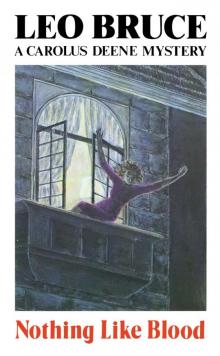 Nothing Like Blood
Nothing Like Blood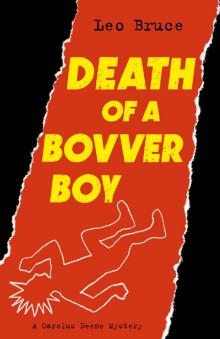 Death of a Bovver Boy
Death of a Bovver Boy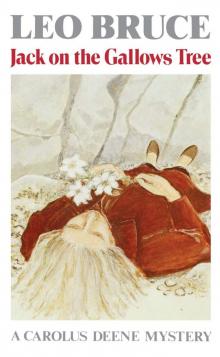 Jack on the Gallows Tree
Jack on the Gallows Tree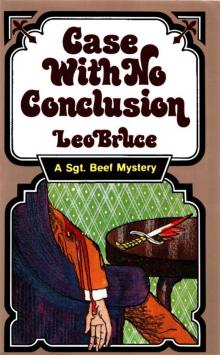 Case with No Conclusion
Case with No Conclusion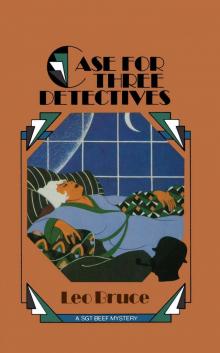 Case for Three Detectives
Case for Three Detectives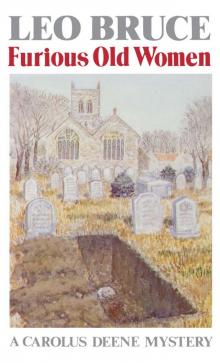 Furious Old Women
Furious Old Women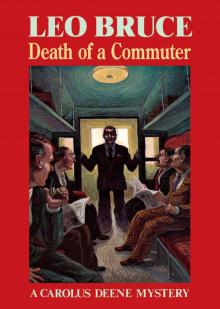 Death of a Commuter
Death of a Commuter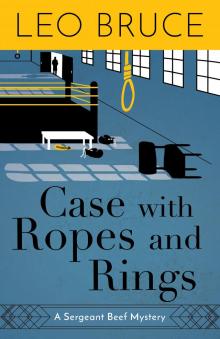 Case with Ropes and Rings
Case with Ropes and Rings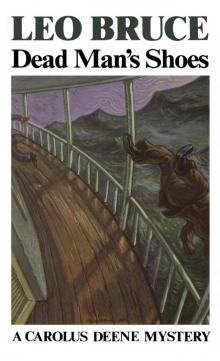 Dead Man’s Shoes
Dead Man’s Shoes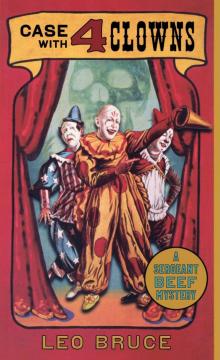 Case with 4 Clowns
Case with 4 Clowns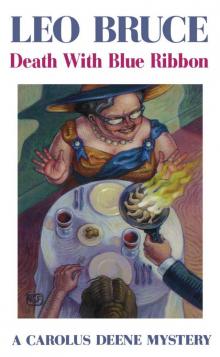 Death with Blue Ribbon
Death with Blue Ribbon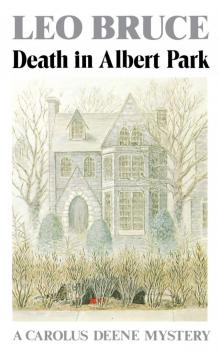 Death in Albert Park
Death in Albert Park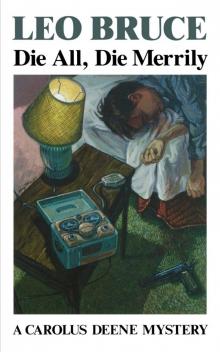 Die All, Die Merrily
Die All, Die Merrily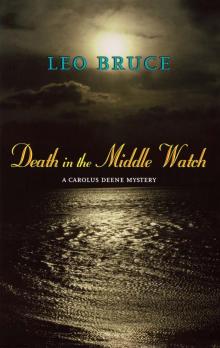 Death in the Middle Watch
Death in the Middle Watch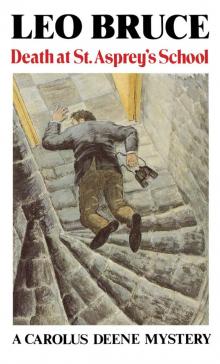 Death at St. Asprey’s School
Death at St. Asprey’s School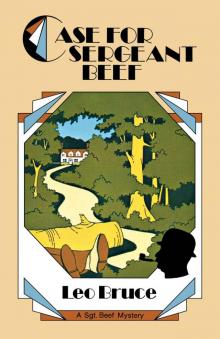 Case for Sergeant Beef
Case for Sergeant Beef